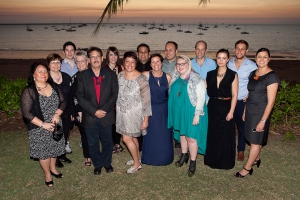Some recent successes of University of Otago Christchurch researchers:
Chlorine bleach key in disease?
Professor Tony Kettle from the Centre for Free Radical Research has won a prestigious Marsden Fund grant to better understand a ‘Jekyll and Hyde’ chemical with a role in heart disease, cancer, cystic fibrosis, and rheumatoid arthritis.
Professor Kettle will investigate chlorine bleach’s role in strengthening collagen by linking to form a resilient mesh. Without this mesh people can develop cataracts and an autoimmune disease that destroys the kidneys and causes the lungs to hemorrhage. However bleach can also have negative effects.
“Chlorine bleach should be viewed as a natural chemical with a Jekyll and Hyde personality. It helps us to fight infections and form strong connective tissue but also endangers our health during uncontrolled inflammation.”
Professor Kettle and his team will work with researchers from Vienna and Budapest on the project.
Improving the treatment and experience for dialysis patients
Chronic kidney disease is common, affecting about 500,000 New Zealanders. It is important because it increases chances of heart disease and death and may lead to needing treatment with dialysis or a kidney transplant. Dialysis therapy is a heavy and costly burden for patients and their families and the health system. However, there is a lack of reliable evidence to improve patient outcomes.
Dr Suetonia Palmer has just been awarded a prestigious Rutherford Discovery Fellowship valued at $800,000 over five years for research project called: “Improving evidence for decision-makers in chronic kidney disease.”
Dr Palmer’s research aims to to provide rigorous overviews of existing research and participant-led enquiry to provide better and more useable information for clinicians, consumers and policy-makers in the field of chronic kidney disease.
Recovering from food addiction
Professor Doug Sellman and his team from the National Addiction Centre have just been granted funding to trial a new treatment for those with obesity called Kia Akina.
“There is a serious need to develop new non-surgical ways of treating obesity because obesity-related diseases are expensive for New Zealand, traditional non-surgical methods are not working, and surgery is very costly,” says Professor Sellman.
Kia Akina uses a ‘food addiction’ approach to obesity. Professor Sellman says the project will test the feasibility, short-term effectiveness and participant satisfaction ofKia Akina within a primary health care setting.
If shown to be effective, Kia Akina will be developed as a non-commercial, low cost network for obesity recovery throughout New Zealand.
Innovation in Indigenous Health
Christchurch’s Maori/Indigenous Health Institute (MIHI) recently won the Australasian award for ‘innovation in Indigenous health curriculum implementation’ at the Leaders in Indigenous Medical Education (LIME) conference.
The LIME conference brings together all 20 medical schools throughout Australia and New Zealand, and hosts attendees from the United States and Canada.

Staff and students of the University of Otago, Christchurch, in Darwin at the Leaders in Indigenous Medical Education (LIME) conference
MIHI director Suzanne Pitama says she and her team were thrilled to receive the award. As there is much collaboration between indigenous teaching teams at University of Otago’s Christchurch, Wellington and Dunedin campuses, the award recognises the innovation of all these teams. It also recognised the systemic support within the University of Otago to prioritise indigenous health within the curriculum.
MIHI oversees the Maori health component of the medical curriculum at the University of Otago, Christchurch.
Award nominees are judged on how well their teaching programmes demonstrate their commitment and experience to understanding and furthering the health of Maori and Indigenous peoples.
The award has been presented for four years, says Pitama. MIHI also won it in the inaugural year.
A review panel of academic peers and members of indigenous medical doctors associations judge the award, Pitama says.
___________________________
This guest post was written by Kim Thomas, Senior Communications Advisor, University of Otago, Christchurch, www.uoc.otago.ac.nz.